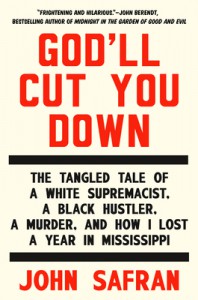Currently reading
Eleven
A Month in the Country
A Tale of the Dispossessed: A Novel
Mesabi Pioneers
The Crusades Through Arab Eyes
Island of a Thousand Mirrors
God�ll Cut You Down: The True Story of a Murder in Mississippi
 This I know for sure: this book is chock full of lies. And also truths. And half-truths and exaggerations. The difficulty is in sorting out which is which. The author found it so difficult to separate wheat from chaff that he simply presents his investigation as a memoir. Look, this is who I interviewed and this is what they told me. I can't get closer to the truth through guessing.
This I know for sure: this book is chock full of lies. And also truths. And half-truths and exaggerations. The difficulty is in sorting out which is which. The author found it so difficult to separate wheat from chaff that he simply presents his investigation as a memoir. Look, this is who I interviewed and this is what they told me. I can't get closer to the truth through guessing.Safran happened on this case more or less by accident. He's a comedian, a prankster, and he had previously played a prank on Richard Barrett, a white supremacist in Mississippi. In the opening, when he was describing his antics, I worried that I was going to hate this book. This Safran guy could be just the kind of horse's arse who could actually make me sympathize with a racist bigot purely out of revulsion for him. But after Barrett was killed and Safran headed to Mississippi again, intent on writing a true crime book instead of making a farcical documentary, he started more or less behaving himself. He got responsible enough for me to end up enjoying the story, enough to get out of the way and actually make the story about something other than himself.
Since Barrett was killed by a young black man, Safran thought he was going to write a book about race. And there's some of that in there. But it turned out that at least some of the blacks living in Barrett's neighborhood didn't know he was a white supremacist, perhaps including the kid who stabbed him. So maybe the crime wasn't entirely about race. It's about race and homophobia. And poverty. And family. And the quirks of Mississippi. And money and power. And fear and mental health. And our (broken) justice system.
In the end, the truth is complicated. And it is different things to different people. Safran did a good job of capturing that complexity and maintaining a chatty but puzzled voice as he receives information. A very good, if uncomfortable, read.
I got a free copy of this book from the publisher.









